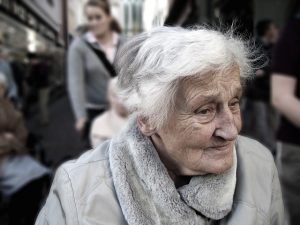Archive for November 2018
Talking to Children About Dementia

Talking to Children About Dementia
By Kristi Beck
Holidays are a time for reconnecting with loved ones. For those with Alzheimer’s Disease or other types of dementia, it may be disorienting to be taken out of a familiar setting—especially if they are now living in a care community. Holiday gatherings can look a little different as multiple generations visit the actual community, versus taking a loved one home for the holiday.
One missed opportunity that I have seen over the years is not preparing children before they visit a grandparent or older adult living with dementia. Parents might think if you don’t discuss this painful disease, you’re protecting your children or that certain behavior can be dismissed as “old age” or forgetfulness. Parents may forget that children will be observing other residents, in addition to the one they are visiting, and those residents will be drawn to their joy and energy.
Remember that children are very insightful and curious. They will ask questions and worry when a grandparent’s behavior changes or when he or she seems absent from their lives. Children might feel nervous around the older adult, especially if he or she is having trouble remembering names or can no longer take care of him or herself the way they once did.
Some suggestions for preparing a child for a visit:
- Be honest and explain the disease. Let them know that Alzheimer’s Disease and dementia does not affect kids and it mostly happens to people over 65 years old. Scientists have discovered medicines that seem to slow the disease down and there’s hope that someday there will be a cure. Age-appropriate information, explaining the disease can be found on such sites as https://kids.alzheimersresearchuk.org/young-kids/
- Encourage children to “go with the flow.” The older adult or grandparent may have an altered sense of reality and arguing or trying to correct him or her might lead to more confusion or agitation. For example, “Grandma sometimes calls me mother.” Explain to children it’s an opportunity to pretend or use their imaginations, but not to argue.
- Prepare ahead of time for “taboo” topics. If you are aware of a particular item of discussion that will elicit emotions, explain it before the visit. “Aunt May gets sad when we talk about her dog Taffy who lives with us.” “Grandpop wasn’t safe driving, so we told him his car is getting fixed at the shop, so he isn’t worried every day.”
Consider meeting in the lobby area or reserving a private dining area for your holiday visit. The Village at Sydney Creek has plenty of space for meeting one-on-one with a resident, including our lobby with fireplace, family room, Activity Room, conference room or one of our lush garden spaces.
Contact Sydney Creek at 805-543-2350 if you are interested in having a staff member visit your child’s schools or club to explain more about Alzheimer’s Disease and dementia.
Suggested Resources:
“About my Grandfather, About My Grandmother” an online video produced by the Alzheimer’s Association
“Really and Truly,” by Emilie Rivard
“Grandma and Me: A Kid’s Guide for Alzheimer’s and Dementia,” by Mary Ann Drummond and Beatrice Tauber Prior
On a lighter note: “Why Did Grandma Put Her Underwear In The Refrigerator?” Max Wallack, Carolyn Given

Understanding Dementia
Understanding Dementia 
Following is a list of symptoms, causes, and conditions taken straight from the Mayo Clinic website.
Overview
Dementia isn’t a specific disease. Instead, dementia describes a group of symptoms affecting memory, thinking and social abilities severely enough to interfere with daily functioning.
Though dementia generally involves memory loss, memory loss has different causes. So memory loss alone doesn’t mean you have dementia.
Alzheimer’s disease is the most common cause of a progressive dementia in older adults, but there are a number of causes of dementia. Depending on the cause, some dementia symptoms can be reversed.
Symptoms
Dementia symptoms vary depending on the cause, but common signs and symptoms include:
Cognitive changes
- Memory loss, which is usually noticed by a spouse or someone else
- Difficulty communicating or finding words
- Difficulty reasoning or problem-solving
- Difficulty handling complex tasks
- Difficulty with planning and organizing
- Difficulty with coordination and motor functions
- Confusion and disorientation
Psychological changes
- Personality changes
- Depression
- Anxiety
- Inappropriate behavior
- Paranoia
- Agitation
- Hallucinations
When to see a doctor
See a doctor if you or a loved one has memory problems or other dementia symptoms. Some treatable medical conditions can cause dementia symptoms, so it’s important to determine the underlying cause.
Causes
Dementia involves damage of nerve cells in the brain, which can occur in several areas of the brain. Dementia affects people differently, depending on the area of the brain affected.
Dementias are often grouped by what they have in common, such as the part of the brain that’s affected or whether they worsen over time (progressive dementias). Some dementias, such as those caused by a reaction to medications or vitamin deficiencies, might improve with treatment.
Progressive dementias 
Types of dementias that progress and aren’t reversible include:
- Alzheimer’s disease.In people age 65 and older, Alzheimer’s disease is the most common cause of dementia.
Although the cause of Alzheimer’s disease isn’t known, plaques and tangles are often found in the brains of people with Alzheimer’s. Plaques are clumps of a protein called beta-amyloid, and tangles are fibrous tangles made up of tau protein.
Certain genetic factors might make it more likely that people will develop Alzheimer’s.
- Vascular dementia.This second most common type of dementia occurs as a result of damage to the vessels that supply blood to your brain. Blood vessel problems can be caused by stroke or other blood vessel conditions.
- Lewy body dementia.Lewy bodies are abnormal clumps of protein that have been found in the brains of people with Lewy body dementia, Alzheimer’s disease and Parkinson’s disease. This is one of the more common types of progressive dementia.
- Frontotemporal dementia.This is a group of diseases characterized by the breakdown (degeneration) of nerve cells in the frontal and temporal lobes of the brain, the areas generally associated with personality, behavior and language.
As with other dementias, the cause isn’t known.
- Mixed dementia.Autopsy studies of the brains of people 80 and older who had dementia indicate that many had a combination of Alzheimer’s disease, vascular dementia and Lewy body dementia. Studies are ongoing to determine how having mixed dementia affects symptoms and treatments.
Other disorders linked to dementia
- Huntington’s disease.Caused by a genetic mutation, this disease causes certain nerve cells in your brain and spinal cord to waste away. Signs and symptoms, including a severe decline in thinking (cognitive) skills usually appear around age 30 or 40.
- Traumatic brain injury.This condition is caused by repetitive head trauma, such as experienced by boxers, football players or soldiers.
Depending on the part of the brain that’s injured, this condition can cause dementia signs and symptoms, such as depression, explosiveness, memory loss, uncoordinated movement and impaired speech, as well as slow movement, tremors and rigidity (parkinsonism). Symptoms might not appear until years after the trauma.
- Creutzfeldt-Jakob disease.This rare brain disorder usually occurs in people without known risk factors. This condition might be due to an abnormal form of a protein. Creutzfeldt-Jakob disease can be inherited or caused by exposure to diseased brain or nervous system tissue.
Signs and symptoms of this fatal condition usually appear around age 60.
- Parkinson’s disease.Many people with Parkinson’s disease eventually develop dementia symptoms (Parkinson’s disease dementia).
Dementia-like conditions that can be reversed
Some causes of dementia or dementia-like symptoms can be reversed with treatment. They include:
- Infections and immune disorders.Dementia-like symptoms can result from fever or other side effects of your body’s attempt to fight off an infection. Conditions such as multiple sclerosis that result from the body’s immune system attacking nerve cells also can cause dementia.
- Metabolic problems and endocrine abnormalities.People with thyroid problems, low blood sugar (hypoglycemia), too little or too much sodium or calcium, or an impaired ability to absorb vitamin B-12 can develop dementia-like symptoms or other personality changes.
- Nutritional deficiencies.Not drinking enough liquids (dehydration); not getting enough thiamin (vitamin B-1), which is common in people with chronic alcoholism; and not getting enough vitamins B-6 and B-12 in your diet can cause dementia-like symptoms.
- Reactions to medications.A reaction to a medication or an interaction of several medications can cause dementia-like symptoms.
- Subdural hematomas.Bleeding between the surface of the brain and the covering over the brain, which is common in the elderly after a fall, can cause symptoms similar to dementia.
- Exposure to heavy metals, such as lead, and other poisons, such as pesticides, as well as alcohol abuse or recreational drug use can lead to symptoms of dementia. Symptoms might resolve with treatment.
- Brain tumors.Rarely, dementia can result from damage caused by a brain tumor.
- This condition, also called hypoxia, occurs when organ tissues aren’t getting enough oxygen. Anoxia can occur due to severe asthma, heart attack, carbon monoxide poisoning or other causes.
- Normal-pressure hydrocephalus.This condition, which is caused by enlarged ventricles in the brain, can cause walking problems, urinary difficulty and memory loss.
Go to https://www.mayoclinic.org/diseases-conditions/dementia/symptoms-causes/ for more information.
It’s a Honey of a Story!

It’s a Honey of a Story
By Kristi Beck
A bountiful “bivouac” of bees came to Sydney Creek Memory Care on the afternoon of September 7th. A visitor alerted us to bees swarming high up in the jacaranda tree located at the front of the building.
Staff members Ann and Mike reached out to the San Luis Obispo County Agriculture Department who provided contact information for the Central Coast Beekeepers Alliance whose members are recognized for relocating bees. Within hours, botanist and beekeeper John Chesnut arrived at Sydney Creek equipped with a bucket pole and a collection box, but surprisingly without a bee protection suit. Chesnut is very comfortable doing what he does and says he is stung almost daily. “Like a lot of allergies, you either get worse or better. I just don’t react to stings,” replied Chesnut. He used lemon balm oil to attract the bees into a collection box and then transport them to his hives. Chesnut estimated that there were approximately 1000 bees.
A “bivouac” is a military term used to describe a temporary camp without tents or cover. In this case, it is when thousands of bees leave their home and set up a temporary location from which they send out scouts to evaluate potential nest sites for the Queen. Bees are generally docile during this process and that can last for 24 to 48 hours. They have neither young nor food to protect, and their defensive instincts are minimal.
Bees and other pollinators play a critical role in producing many of California’s agricultural products and in maintaining a healthy environment. Insecticides, habitat loss and parasites all threaten honey bee populations. Beekeepers are losing bees at higher rates and having to scale back on honey production. For bees to make a comeback, human help is needed. It’s easy to do your part in saving bee populations by planting pollination-friendly plants like the California poppy and using relocation instead of extermination.



